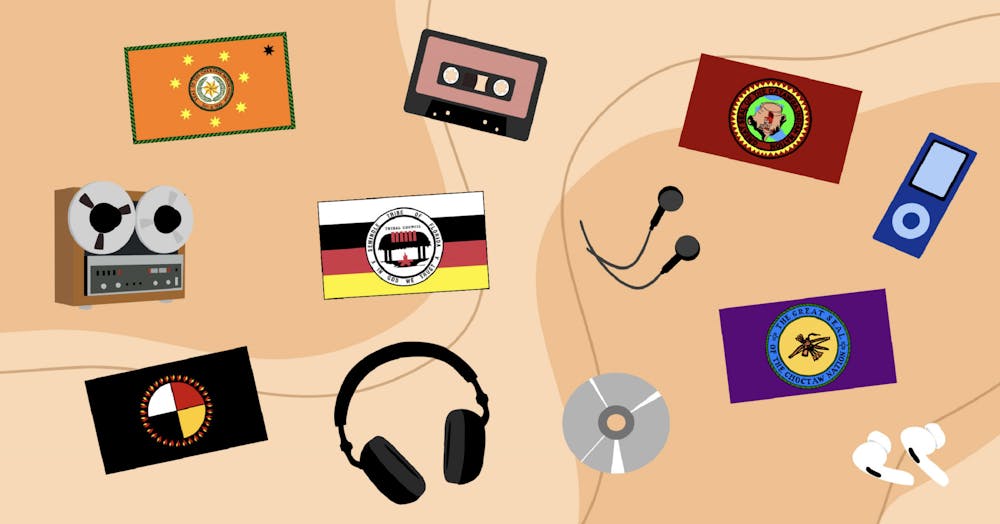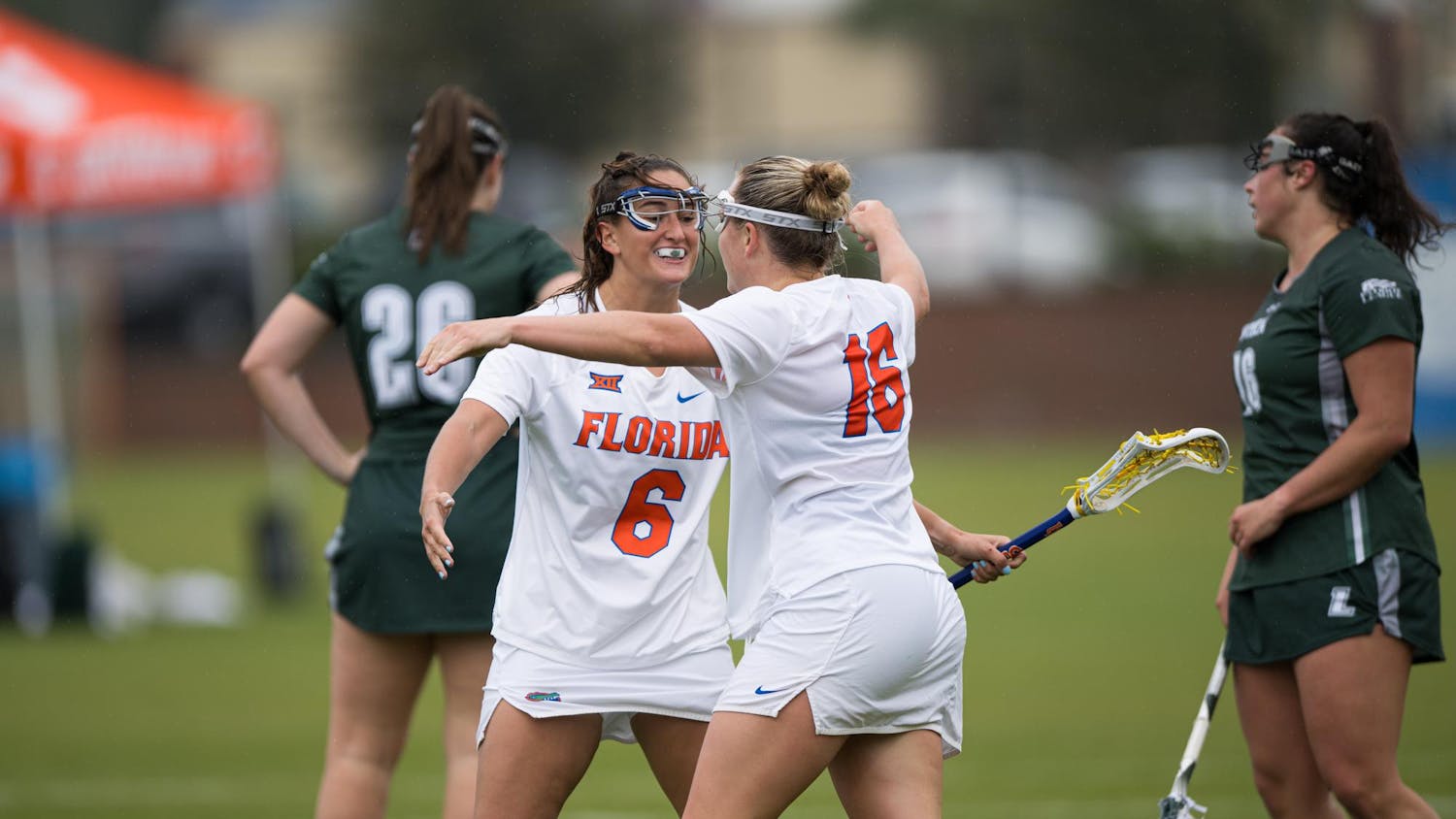More than 40 years ago, Gary Wade, a citizen of South Carolina’s indigenous Catawba Nation, sat down for an interview as part of a project to gather oral histories for UF.
The 15-minute interview touched on Wade’s religious life, his service in the U.S. Navy during the Vietnam War and his childhood, which was marked by racism as early as elementary school. Despite this, he said he maintained pride in his Native American identity.
“I look at it this way: I’m proud to be what I am,” he said in the interview. “I am an American Indian, and it was instilled in me that nobody was any better than I am, but I’m no better than anyone else, either.”
Like many of the interviews with indigenous people collected in the 1970s, the physical tape sat in a Samuel Proctor Oral History Program collection at UF for decades. The Catawba Nation in Rock Hill, South Carolina remained without an audio record of the interview until the tape was individually digitized last year upon request of Wade’s family.
Now, about 1,000 stories like his will return to their communities of origin.
UF is among seven universities — and the only one east of the Mississippi — that will receive a total of $1.36 million from the Doris Duke Charitable Foundation to launch a Native American oral history revitalization project to make indigenous oral histories more accessible.
Indigenous cultures have a long history of oral tradition; before Europeans landed in North America, there were no recorded writing systems among indigenous groups. Knowledge such as history, scientific advancements and social customs was spread orally, which meant it could be lost if it wasn’t passed down.
The oral histories collected by UF and other universities across the country could have met a similar fate without the grant, which will allow them to revive these stories.
The Samuel Proctor Oral History Program — a research center at UF dedicated to collecting audio interviews to preserve historical events and information — will work with UF libraries and the foundation to digitize existing oral history and house it on an online platform, Mukurtu, named after the indigenous Australian Warumungu word for “a safe place to keep sacred materials.” Although still in testing stages, the platform hopes to collect and share materials from each of the universities involved in the project.
Mukurtu will mostly house collections of oral histories, but will also include some photographs and other indigenous cultural artifacts from across the country, Deborah Hendrix, the digital humanities coordinator of the Samuel Proctor Oral History Program at UF, said. While it’s not yet open to the public, the seven universities have already started adding their finalized oral histories.
UF’s original 50-year-old collections cover Native American tribes east of the Mississippi, such as Catawba, Lumbee, Seminole, Cherokee and Choctaw, Hendrix said. Samuel Proctor, a scholar and pioneer of oral history, began interviewing indigenous groups in 1967 after receiving a grant to do so, she said.
After people like Proctor recorded the interviews, she said, the only way to listen to the tapes was to travel to UF.
“They put all of that to bed by the early 80s,” Hendrix said. “It was done, and it was transcribed, and that’s where it stayed.”
Because UF’s collection holds audio files from indigenous groups from Virginia, the Carolinas and Alabama, it can be difficult for members of these groups to access the files of their recorded histories in their current, physical state, Ginessa Mahar, the principal investigator of the project at UF, said. That’s why it’s important to digitize the files, she said.
Mahar is working with the Samuel Proctor Oral History Program to make the audio collection more accessible for native communities by digitizing it and putting it online. The program is also working with indigenous groups to ensure their history is shared in a culturally responsible way, she said.
Some groups may want to keep the knowledge of cultural origins or “trade secrets” within their own communities, so the platform will have varying levels of accessibility, from publicly available to only open for select individuals in the tribe.
The Mukurtu platform will allow the tribes to determine who can access certain files, she said.
“In allowing the tribal communities to decide upon who gets to access what types of information, we’re really giving the power back to them and empowering them to make decisions about their own cultural heritage,” Mahar said.
By giving this intellectual autonomy back to the indigenous groups, the project steps away from the previous scientific perspective of using Native American communities for research, she said. In the past, researchers were focused on their own work rather than the indigenous communities themselves.
“The information in these oral history interviews doesn’t belong to the researchers,” she said. “It doesn’t belong to any institution. It belongs to those individuals and their communities.”
One of these communities is Gary Wade’s own Catawba Indian Nation.
The original transcript of his interview is available on Samuel Proctor Oral History Program’s website, although there are some inconsistencies. Original transcribers edited or omitted certain parts of the interview, Mahar said, which is something UF and the Samuel Proctor Oral History Program hope to amend by re-transcribing the interviews.
Through staticky audio, Wade described how he gained popularity through his self-confidence and abilities when he reached junior high during the interview.
“I had been pushed around and degraded so much that anytime anybody was on the football field and he told me he was better than I was, I didn’t say I was better than he was,” he said. “I just went and I proved to them that what they could do, I could do just as good or better.”
At the end of the interview, when asked if he was proud to be an American Indian, Wade replied, “Yes I am. I can’t see being anything else.”
Pam Wade, Gary’s fourth wife, found the transcript of his interview during a Google search in December.
Pam considers genealogy a hobby of hers. She was searching for any records of Wade she could find to add to her family history when she came across UF’s online transcript of the oral history. She immediately emailed the Samuel Proctor Oral History Program to obtain the audio recording.
Once she got it, she shared it with her children, grandchildren and extended family.
“For me, it was like finding treasure,” she said. “Hearing his voice from 1974 from when he was young and healthy, it just brought so much joy into my life and into my heart.”
Wade passed away in January 2016, but he had been sick since 2008, Pam said. During his time in the Navy in Vietnam, Wade was exposed to Agent Orange, an herbicide used by the U.S. military to kill North Vietnamese crops and forests. The chemicals in Agent Orange caused Wade to develop heart disease, diabetes, nerve damage and digestive issues.
It had been decades since Pam had heard her husband free of illness, and her grandchildren only knew a Wade who was already sick.
“It’s like a treasure trove,” she said. “It can only help people to access those memories of their families.”
Many more of Gary’s family members were interviewed: his parents, a nephew, one of his grandmothers, even his nephew’s wife’s grandmother. Pam looks forward to the digitized interviews of the rest of the family to add to her tree.
“It’s not just me. It’s a lot of people here on the reservation,” she said. “It is going to be so important, and it will be a treasured item to add to the family history.”
Contact Sofia Echeverry at secheverry@alligator.org. Follow her on Twitter @sofecheverry.

Sofia is a news assistant on The Alligator's university desk. This is her second semester at paper, where she previously worked as a translator for El Caimán.






